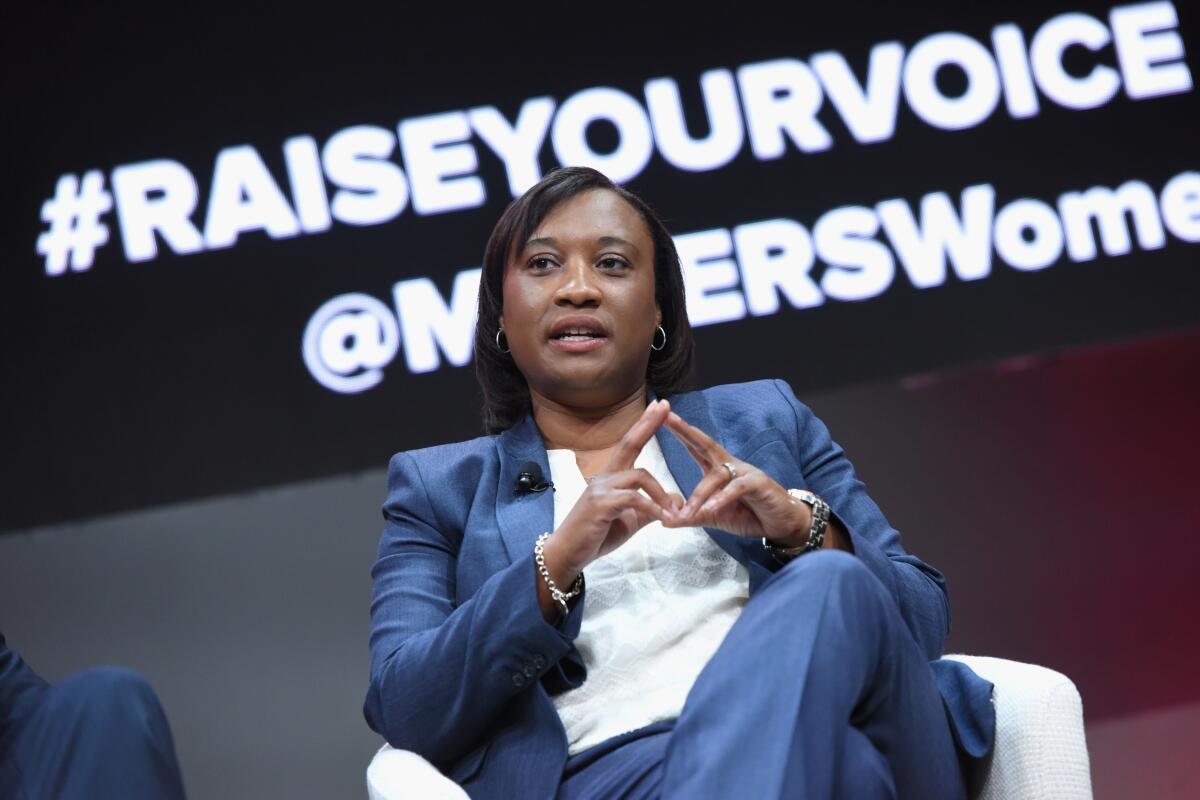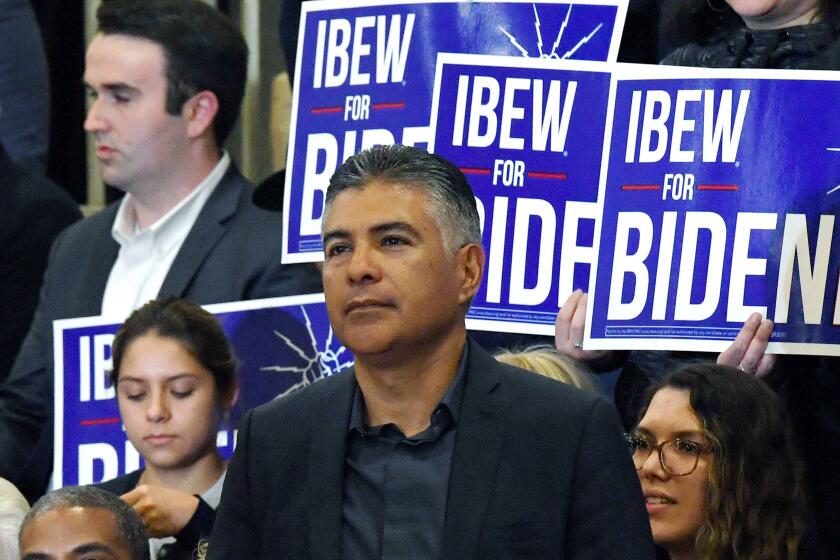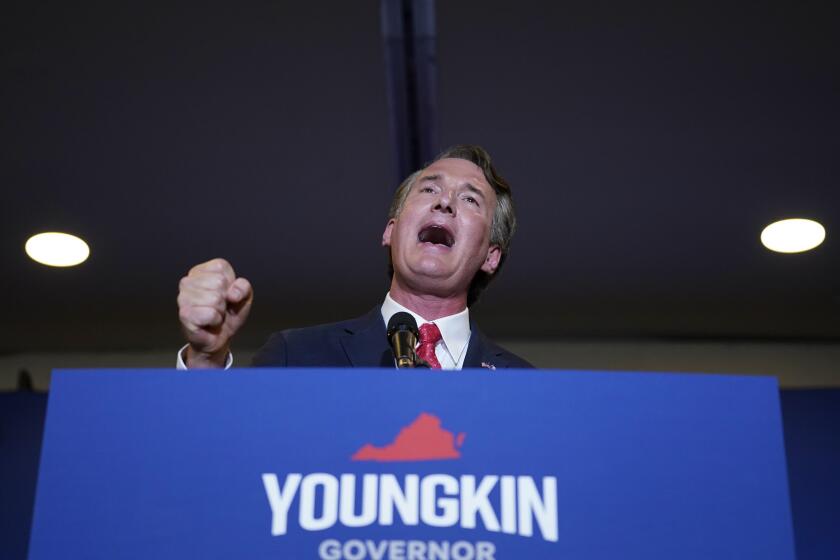Column: For women in politics, California strategist offers a fresh face and added mission

- Share via
WASHINGTON — When Ellen Malcolm founded EMILY’s List, an organization dedicated to electing women to political office, she worried people would think the name was, well, kind of dumb.
She’d watched a favorite candidate for U.S. Senate lose in part because she ran out of cash. So Malcolm came up with an acronym — Early Money Is Like Yeast — reflecting a belief that seeding fledgling candidates with support would then keep the dollars flowing.
(Yeast helps raise dough, get it?)
Malcolm needn’t have worried. From its small start as a bunch of like-minded women gathered in her basement, EMILY’s List has grown into a political powerhouse that builds campaigns and steers millions of dollars each election to hundreds of pro-choice Democrats, in races from city council to the White House.
The group has had three leaders since its founding in 1985: Malcolm; Stephanie Schriock, a veteran campaign manager, and Laphonza Butler, a longtime labor organizer and California political strategist, who took over in September.
As a Black woman, Butler is the first woman of color to head the organization, so from the start she brings a different image and perspective to a group some may associate more readily with suburban white women in puffy jackets marching, latte in hand, against Donald Trump.
Rep. Tony Cárdenas, who has helped with outreach, says his party has lots of work to do.
“What I bring, I think, is an ability to connect with every woman from every walk of life, and do it from a very authentic place,” Butler said, naming some of the Black, Latino and Asian American women the group has helped boost into office. “I think I’ve sort of uniquely traveled in my journey to get to this moment.”
Butler, 42, was born in small-town Magnolia, Miss. — also the birthplace of Britney Spears’ mom — in a family that knew hardship on a first-name basis. After suffering a series of heart attacks, Butler’s father died when she was 16, leaving her mother to work as many as three jobs at once to support her three children.
At Jackson State University, a historically Black college, Butler’s instructors included several veterans of the civil rights movement, who instilled in her a penchant for activism and commitment to social justice. “What are you doing for freedom? That was always the question,” Butler said. “What are you doing for freedom today?”
As a labor organizer, she worked with nurses in Baltimore and Milwaukee, janitors in Philadelphia and hospital workers in New Haven, Conn. In 2009, Butler moved to California, where she organized caregivers and in-home nurses.
In 2013, she assumed leadership of the state’s largest labor union, the Service Employees International Union, where Butler engaged in a number of campaigns and legislative battles, including efforts to boost California’s minimum wage and raise income taxes on its wealthiest residents.
Butler left the union in 2018 to join one of the state’s leading political consulting firms and played a central role in Kamala Harris’ 2020 run for president; she remains friendly with the vice president, whom Butler first met in 2010 as Harris waged an uphill, ultimately successful, bid for attorney general.
At EMILY’s List, Butler’s main goal, obviously, is electing more women to office, in keeping with its founding mission. But she hopes, too, to elect more types of women to office.
There are barriers Butler hopes to break down, or at least make less daunting for candidates of color. One is the challenge of raising sufficient campaign cash.
Take, for instance a teacher, nurse or some other political prospect who can’t afford to self-finance a campaign. She probably doesn’t have a large circle of well-off business colleagues or affluent acquaintances to draw upon. The difficulty, then, is demonstrating enough viability early on to get large numbers of donors interested in contributing.
There is a cultural resistance, Butler said, among Black women to ask others for money. She cited her mother, who worked all those jobs rather than accept handouts.
“As a Black woman who was raised by a prideful Black woman, I know what that characteristic is. I have it,” Butler said with a deep laugh, as rain spattered Washington’s sidewalks and marble monuments.
Tucked inside a restaurant booth at a downtown hotel, Butler went on. “The work of EMILY’s List is to [boost] a candidate’s confidence,” she said, telling them, “What you’re asking for in your campaign is an investment, with a return in terms of how you’re going to show up and govern.”
The party stands to lose control of the House and perhaps the Senate in the 2022 midterms. Time to stop the infighting.
One thing Butler’s organizing experience taught her — through grinding campaigns, fierce opposition, reversals and slow-going, inch-by-inch progress — was persistence.
Butler and fellow Democrats will surely need it. A difficult election cycle looks potentially even more calamitous after the party lost Tuesday’s gubernatorial race in Virginia and nearly surrendered the governorship in New Jersey — states that voted overwhelming for Joe Biden in 2020.
Butler spoke of candidates who ran and lost, got “punched in the nose,” then got back up and eventually won. She related stories of janitors, nurses and others who had to struggle for acknowledgment before seeking power.
“Just look at our home healthcare workers,” Butler said. “Those women fought for that union for, what, 12 years before it was even recognized. And then they had to build it into something that actually improved their wages and working conditions.
“So what I think the labor movement has helped prepare me for is both the patience of playing a long game and knowing how to have wins along the way.”
Which, given the gloomy outlook for Democrats, is not a dumb thing at all.
More to Read
Get the latest from Mark Z. Barabak
Focusing on politics out West, from the Golden Gate to the U.S. Capitol.
You may occasionally receive promotional content from the Los Angeles Times.











